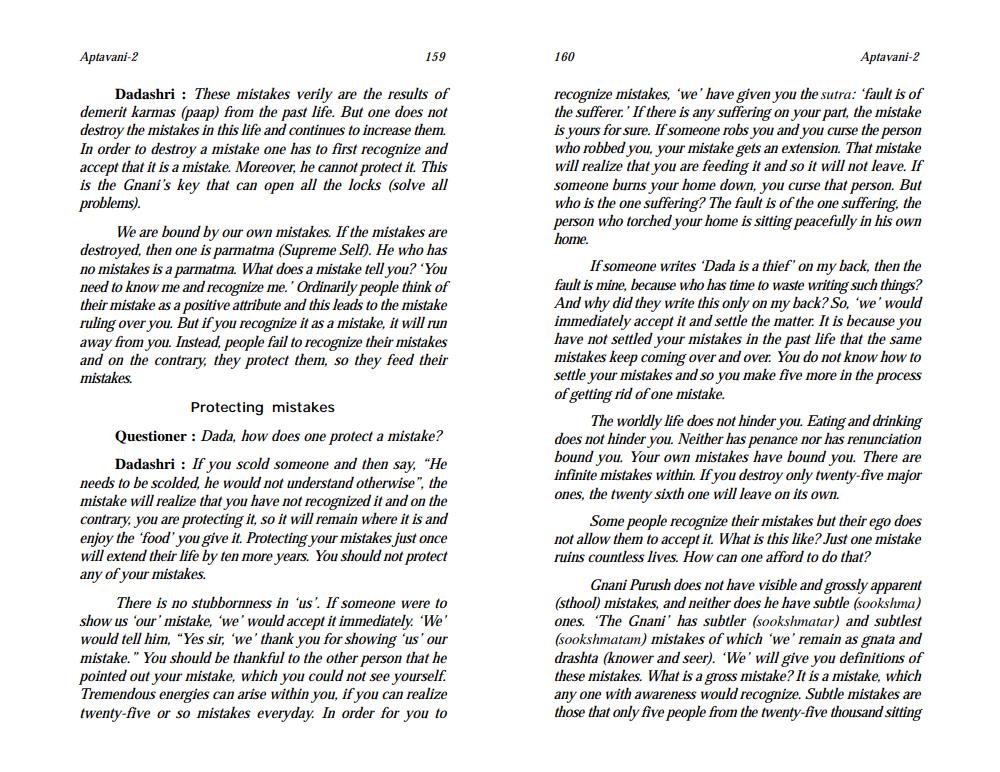________________
Aptavani-2
159
160
Aptavani-2
Dadashri : These mistakes verily are the results of demerit karmas (paap) from the past life. But one does not destroy the mistakes in this life and continues to increase them. In order to destroy a mistake one has to first recognize and accept that it is a mistake. Moreover, he cannot protect it. This is the Gnani's key that can open all the locks (solve all problems).
We are bound by our own mistakes. If the mistakes are destroyed, then one is parmatma (Supreme Self). He who has no mistakes is a parmatma. What does a mistake tell you? 'You need to know me and recognize me.' Ordinarily people think of their mistake as a positive attribute and this leads to the mistake ruling over you. But if you recognize it as a mistake, it will run away from you. Instead, people fail to recognize their mistakes and on the contrary, they protect them, so they feed their mistakes.
Protecting mistakes Questioner : Dada, how does one protect a mistake?
Dadashri : If you scold someone and then say, "He needs to be scolded, he would not understand otherwise", the mistake will realize that you have not recognized it and on the contrary, you are protecting it, so it will remain where it is and enjoy the 'food you give it. Protecting your mistakes just once will extend their life by ten more years. You should not protect any of your mistakes.
There is no stubbornness in 'us'. If someone were to show us our' mistake, 'we' would accept it immediately. 'We' would tell him, "Yes sir, 'we' thank you for showing 'us' our mistake." You should be thankful to the other person that he pointed out your mistake, which you could not see yourself. Tremendous energies can arise within you, if you can realize twenty-five or so mistakes everyday. In order for you to
recognize mistakes, 'we' have given you the sutra: 'fault is of the sufferer.' If there is any suffering on your part, the mistake is yours for sure. If someone robs you and you curse the person who robbed you, your mistake gets an extension. That mistake will realize that you are feeding it and so it will not leave. If someone burns your home down, you curse that person. But who is the one suffering? The fault is of the one suffering, the person who torched your home is sitting peacefully in his own home.
If someone writes 'Dada is a thief' on my back, then the fault is mine, because who has time to waste writing such things? And why did they write this only on my back? So, 'we' would immediately accept it and settle the matter. It is because you have not settled your mistakes in the past life that the same mistakes keep coming over and over. You do not know how to settle your mistakes and so you make five more in the process of getting rid of one mistake.
The worldly life does not hinder you. Eating and drinking does not hinder you. Neither has penance nor has renunciation bound you. Your own mistakes have bound you. There are infinite mistakes within. If you destroy only twenty-five major ones, the twenty sixth one will leave on its own.
Some people recognize their mistakes but their ego does not allow them to accept it. What is this like? Just one mistake ruins countless lives. How can one afford to do that?
Gnani Purush does not have visible and grossly apparent (sthool) mistakes, and neither does he have subtle (sookshma) ones. "The Gnani' has subtler (sookshmatar) and subtlest (sookshmatam) mistakes of which 'we' remain as gnata and drashta (knower and seer). 'We will give you definitions of these mistakes. What is a gross mistake? It is a mistake, which any one with awareness would recognize. Subtle mistakes are those that only five people from the twenty-five thousand sitting




